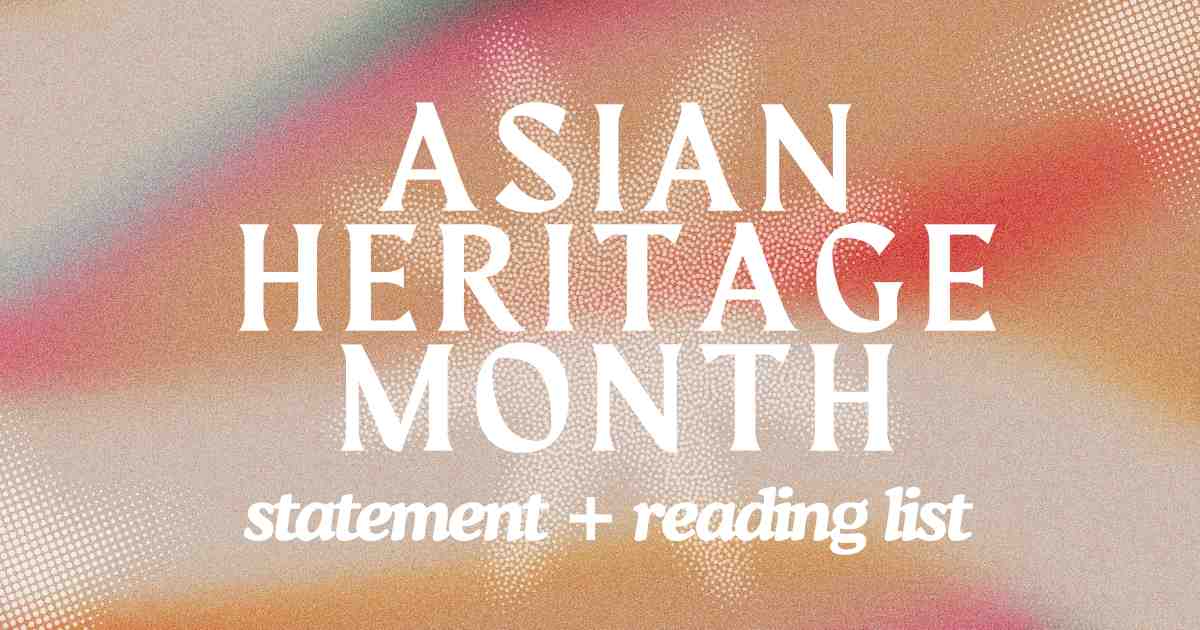Asian Heritage Month Statement and Reading List
In 2025, we celebrate 23 years since, following a motion proposed by Senator Vivienne Po in December 2001 and officially declared by the government in 2002, May became a valued time to recognize Asian Heritage Month in Canada. However, Asian Heritage Month had been celebrated unofficially since at least the 90s, and Asian communities in Canada had been advocating, innovating, and contributing to civic, artistic, and social endeavours for decades beforehand despite racist anti-immigration laws—and they continue to be, a fact that Room Magazine is honored to commemorate.
However, this Asian Heritage Month arrives on the heels of a mass tragedy, at the Lapu-Lapu Day Block Party, that never should have happened, whose losses were as unnecessary as they were unfair. While undoubtedly Asian Heritage Month is a time of celebrating the cultures of diverse Asian and Asian-diasporic peoples, and it always will be, 2025’s Asian Heritage Month is also one of deep mourning, organizing, and reflection for many families and particularly Filipino communities in so-called Vancouver and worldwide.
Room Magazine, as a cultural and artistic organization located in a city with a rich history of Asian cultures, solidarities, and contributions, swears to uphold, amplify, celebrate, and materially support Asian communities in so-called Vancouver and beyond. Specifically in light of the Lapu-Lapu Day Block Party tragedy, Room Magazine will be donating a portion of the month’s magazine sales to victims and their families, and we urge our vibrant community to continue to do what they have always done: come together to uplift the brilliance and humanity of Asian and Asian-Canadian communities, and write toward truth, love, wrath, and the fruits of activism.
We turn our attention to anti-colonialist figures of the past, such as Lapu-Lapu himself, and writers, artists, and activists of the present, some of whom Room Magazine has been fortunate to publish in our archives. A selection of these consciousness-raising writings is below, for sharing, learning from and alongside, and self-reflection in community.
Asian Heritage Month Reading List
From “On Revolution: A Conversation Between Grace Lee Boggs and Angela Davis,” by Grace Lee Boggs, via Reimagine
Grace Lee Boggs: How do we reimagine education? How do we reimagine community? How do we reimagine family? How do we reimagine sexual identity? How do we reimagine everything in the light of a change that is so far reaching and is our responsibility to make? We have to think beyond capitalist categories. We can’t expect them to make it. We have to do the reimagining ourselves.
From “ADVICE FROM MY GREAT-GRANDMOTHER: POEM FOR THE DAUGHTER I NEVER HAD,” by Bhanu Kapil, via the 87 Press
Goodnight, said the leopard, a word stitched vertically in front of its face.
Can you discern it?
Goodnight, Empire.
Goodnight, white supremacy.
Your veins are dangling from my teeth.
From “Unsettling the Nation from the Land: A Conversation with Manu Karuka,” by Vivek Bald and Manu Karuka, via the Asian American Writers’ Workshop
There’s a so-called war on terror right now, and it’s a contemporary face of imperialist war. I believe that for immigrants, for poor and working people, for oppressed peoples, here in North America, it’s our task to turn this imperialist war into a multi-front anti-colonial movement.
From “I Don’t Know What Will Kill Us First: The Race War or What We’ve Done to the Earth,” by Fatimah Asghar, via Poets.org
so I count my hopes: the bumblebees
are making a comeback, one snug tight
in a purple flower I passed to get to you;your favorite color is purple but Prince’s
was orange & we both find this hard to believe;
From “A Feature Interview: Ruchika Gothoskar interviews Room’s 2025 Fiction Contest Judge, Janika Oza”, by Janika Oza and Ruchika Gothoskar, via Room Magazine
Janika Oza: I wanted to write towards that question of, what does it mean to be a migrant community from a colonized place who then settled in another colonized place, what does it mean for us to be seeking refuge on stolen land?
From The Joy Luck Club, by Amy Tan
The pain of the flesh is nothing. The pain you must forget. Because sometimes that is the only way to remember what is in your bones. You must peel off your skin, and that of your mother, and her mother before her. until there is nothing. Non scar, no skin, no flesh.
From “Palestine and the Asian American Question,” by Najwa Mayer and Randa Tawil, via the Asian American Writers’ Workshop
“…‘Asian America’ continues to wrestle between a racialized identity borne of U.S. empire on the one hand and a social critique of race, nation, and empire on the other—and continues to acknowledge the historical role of Palestine and Southwest Asia in Asian American politics. Indeed, a plethora of Asian American prose reminds us that Palestine is not just in Asia but part of the colonial histories of Asian displacement in the U.S. Palestine was an allied cause in the twentieth-century anticolonial, antiracist, and student movements that bore the ‘Asian American’ concept as a coalitional, transnational form of organizing.”
From War Talk, by Arundhati Roy
Another world is not only possible, she is on her way. On a quiet day, I can hear her breathing.














